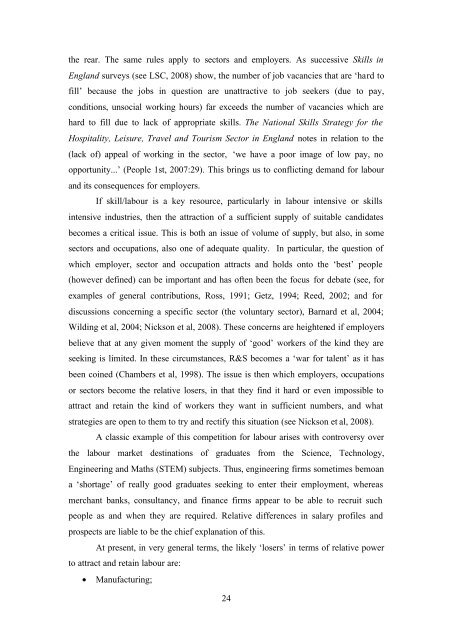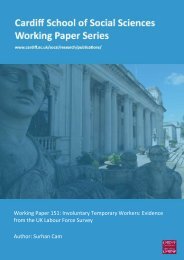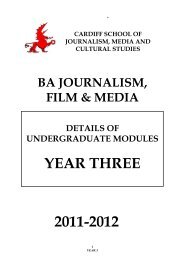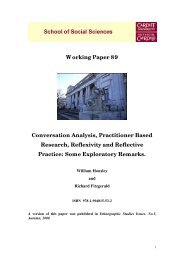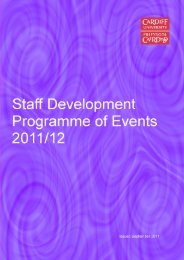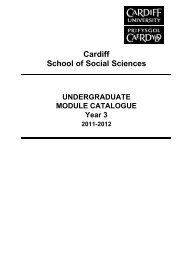Recruitment and Selection â the Great Neglected ... - Cardiff University
Recruitment and Selection â the Great Neglected ... - Cardiff University
Recruitment and Selection â the Great Neglected ... - Cardiff University
Create successful ePaper yourself
Turn your PDF publications into a flip-book with our unique Google optimized e-Paper software.
<strong>the</strong> rear. The same rules apply to sectors <strong>and</strong> employers. As successive Skills in<br />
Engl<strong>and</strong> surveys (see LSC, 2008) show, <strong>the</strong> number of job vacancies that are ‘hard to<br />
fill’ because <strong>the</strong> jobs in question are unattractive to job seekers (due to pay,<br />
conditions, unsocial working hours) far exceeds <strong>the</strong> number of vacancies which are<br />
hard to fill due to lack of appropriate skills. The National Skills Strategy for <strong>the</strong><br />
Hospitality, Leisure, Travel <strong>and</strong> Tourism Sector in Engl<strong>and</strong> notes in relation to <strong>the</strong><br />
(lack of) appeal of working in <strong>the</strong> sector, ‘we have a poor image of low pay, no<br />
opportunity...’ (People 1st, 2007:29). This brings us to conflicting dem<strong>and</strong> for labour<br />
<strong>and</strong> its consequences for employers.<br />
If skill/labour is a key resource, particularly in labour intensive or skills<br />
intensive industries, <strong>the</strong>n <strong>the</strong> attraction of a sufficient supply of suitable c<strong>and</strong>idates<br />
becomes a critical issue. This is both an issue of volume of supply, but also, in some<br />
sectors <strong>and</strong> occupations, also one of adequate quality. In particular, <strong>the</strong> question of<br />
which employer, sector <strong>and</strong> occupation attracts <strong>and</strong> holds onto <strong>the</strong> ‘best’ people<br />
(however defined) can be important <strong>and</strong> has often been <strong>the</strong> focus for debate (see, for<br />
examples of general contributions, Ross, 1991; Getz, 1994; Reed, 2002; <strong>and</strong> for<br />
discussions concerning a specific sector (<strong>the</strong> voluntary sector), Barnard et al, 2004;<br />
Wilding et al, 2004; Nickson et al, 2008). These concerns are heightened if employers<br />
believe that at any given moment <strong>the</strong> supply of ‘good’ workers of <strong>the</strong> kind <strong>the</strong>y are<br />
seeking is limited. In <strong>the</strong>se circumstances, R&S becomes a ‘war for talent’ as it has<br />
been coined (Chambers et al, 1998). The issue is <strong>the</strong>n which employers, occupations<br />
or sectors become <strong>the</strong> relative losers, in that <strong>the</strong>y find it hard or even impossible to<br />
attract <strong>and</strong> retain <strong>the</strong> kind of workers <strong>the</strong>y want in sufficient numbers, <strong>and</strong> what<br />
strategies are open to <strong>the</strong>m to try <strong>and</strong> rectify this situation (see Nickson et al, 2008).<br />
A classic example of this competition for labour arises with controversy over<br />
<strong>the</strong> labour market destinations of graduates from <strong>the</strong> Science, Technology,<br />
Engineering <strong>and</strong> Maths (STEM) subjects. Thus, engineering firms sometimes bemoan<br />
a ‘shortage’ of really good graduates seeking to enter <strong>the</strong>ir employment, whereas<br />
merchant banks, consultancy, <strong>and</strong> finance firms appear to be able to recruit such<br />
people as <strong>and</strong> when <strong>the</strong>y are required. Relative differences in salary profiles <strong>and</strong><br />
prospects are liable to be <strong>the</strong> chief explanation of this.<br />
At present, in very general terms, <strong>the</strong> likely ‘losers’ in terms of relative power<br />
to attract <strong>and</strong> retain labour are:<br />
• Manufacturing;<br />
24


